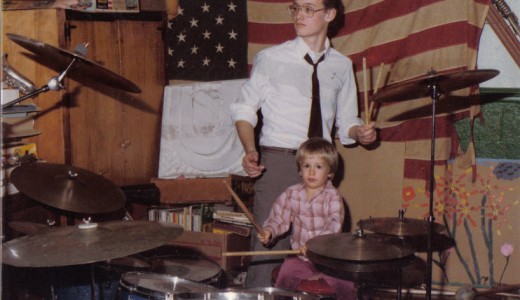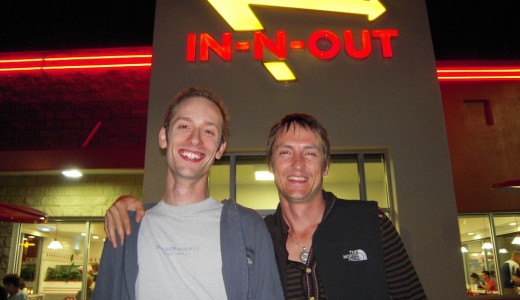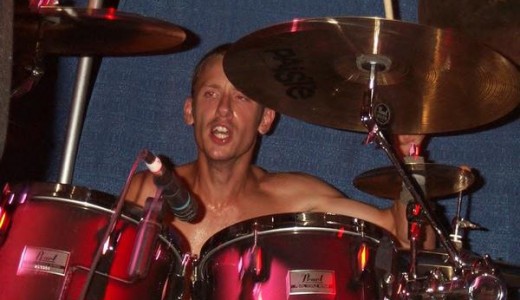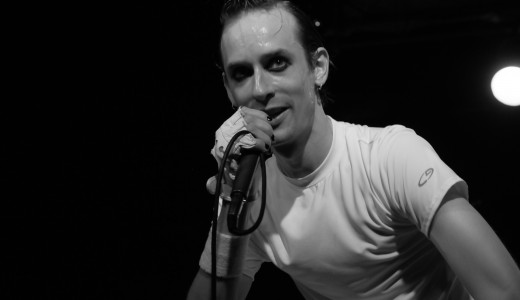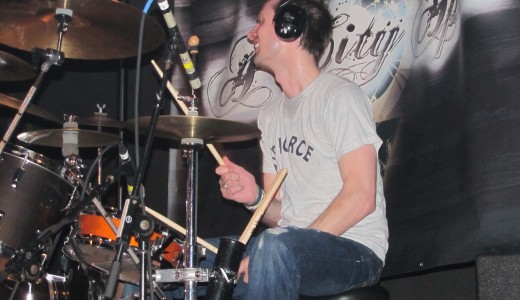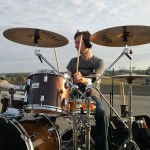About Dave
Dave was born in 1981 to a musical family in Detroit, Michigan. It’s something of a family legend that his mother went into labor when she was yelling at her younger brother, Fred, to stop playing drums in the basement of the house where they were all living at the time. Fred was the youngest of the family, and Dave idolized him from that moment on. Fred had a van where he stored his gear and a boat that he would use to jam at the family’s lake property. At the family’s only reunion, Dave asked Fred for some drumsticks. The huge family portrait has Dave front and center holding those drumsticks with a death grip.
Dave moved to Cleveland, Ohio, in 1987 and started drumming soon after at age 11. His parents didn’t want to waste money on a full kit if he decided drumming wasn’t for him, so they bought him a snare drum for Christmas. They made him start taking lessons and join the school band to see how he did, and when he pursued drumming with a passion, Fred helped Dave pick out a kick drum and 16″ crash for the next Christmas. More pieces followed over the next couple of years—a hi-hat, rack toms, more cymbals, and a floor tom. It was a full kit, but it was a mess. Over the next three years, Dave fleshed out the kit on his own using money from a paper route.
When Dave turned 14, his family moved him to Adrian, Michigan. He met some like-minded musicians and started playing cover songs that ranged from Nirvana to Tool to Dream Theater. They formed a band, Flood, and wrote and home-recorded an entire album together. In 1996, Flood entered a county-wide battle of the bands and won. The judges were especially impressed by Dave’s interpretation of the song One by Metallica. As a prize, they recorded their first studio album. They hired a different guitarist and vocalist to give them a harder, edgier sound as the band Blindside and wrote another album together. Blindside entered and won the battle of the bands again in Dave’s junior year, allowing him to complete his second studio album at age 16.
After high school, Dave moved back to Cleveland. He set up his drums in his girlfriend’s basement and focused on defining his style, which was influenced by his experiences with past projects and the school marching band, as well as media he found inspiring. By the time he moved to Chapel Hill, North Carolina, in 2000, he was ready for more. Dave played around with various side projects, including a gothic math-metal band, Richard Cranium, with his younger brother, Evan.
In early 2001, Dave joined the reggae/ska band Regatta 69. He learned reggae style from the singer/songwriter and toured the East Coast. Along the way, he met Chris Chameleon and the band Boo!, who were returning from a tour of their own and were meeting up with Regatta 69 to follow along.
Chris and the rest of Boo! had a significant impact on Dave’s perception of music and what it took to be a professional musician. Chris went on to become a multi-platinum award-winning singer/songwriter in his home country of South Africa and still tours around the world.
In the summer of 2002, Dave moved back to Ann Arbor to reconnect with the guitarist of Blindside, who had invited Dave to become a part of the nu-metal/hardcore band Supergenius. Supergenius was huge at the time and was already well-established with two professional studio albums. Dave helped to write the third album and toured with the band, playing at large festivals, often as the headlining act. They recorded a potential EP with platinum producer Andy Patalan at The Loft in Saline, Michigan. However, internal conflicts led Supergenius to disband in early 2003, and Dave moved to Arizona.
When Dave arrived in Tucson, Arizona, he was tired and sore from his experiences in the music industry. As a result, he named his new alternative/experimental rock band Washout. They wrote over 30 songs and performed all over Tucson. In the meantime, Dave was working on his side projects, The Kressler and Tea and Crumpets. The Kressler was Dave’s introduction to singing, piano, and recording. He started on a Casio keyboard and recorded with a computer microphone and an entry-level recording interface. Over time and with more experience, the quality of the songs began to improve. He never took himself too seriously, so he used the most unusual vocal and production ideas he could think of. Dave wrote over 60 songs (which he describes as “psychedelic/circus-electronica”) as The Kressler between 2003 and 2007.
Tea and Crumpets was also less serious than Dave’s other projects. There were only two band members—Dave (singing) and a guitarist—and Dave went out of his way to make insane and comedic lyrics sitting on catchy melodies. They toured coffee houses in Tucson, receiving great reviews for the noises Dave made with his mouth and his wacky stage antics.
Washout disbanded in 2006 because Dave wanted to start a new, heavier project. He met Sean Hill and started The Beginning. They began writing for what would eventually become the band Sixer. Around this time, Dave started recording actual bands instead of digital elements, and he recorded Sixer‘s entire album through a four-channel mixing board and a mini-disc player. Sixer had several different musicians playing at different times, but the band fell apart when Sean had to leave to return to his family during summer break from college. When Sean returned, he found Dave singing for fun in what would soon become The Gray.
The Gray began with Sean on drums, Dave singing and playing keys, and Eddy Mena on guitar. It was considered a side project because none of the band members were playing on their main instruments. Dave started recording what he referred to as practice vocal sessions (PVSes), where he took simple ideas as a base for writing and mixing keys and many vocal ideas. With some cutting and pasting, he was able to formulate entire songs before they were even written out with the entire band.
Dave quit Sixer to focus full-time on The Gray. Primitive sketches became full-on hard rock songs that bordered on gothic metal. When Sean left in the summer of 2007, Dave started the search for a new drummer while he improved his songwriting and production skills. Eventually, Dave took over songwriting and recorded almost all of the instrument tracks (save for guitar and bass) on The Gray‘s album, Burning. From start to finish, Burning took from August 2008 to July 2009, during which time Dave was continuously auditioning drummers who might be able to cover his parts so they could take the gigs they were being offered. After an exhausting search, they settled on the manager of the drum department from the local Guitar Center.
The Gray came to a screeching halt when internal conflict blew them apart. Most of the discouragement leading up to the breakdown was the never-ending search for a drummer who could cover Dave’s parts. Discouraged by the failing efforts of The Gray, Sixer, and The Beginning, Dave wanted a fresh start. He joined Left Outlet—a band based out of Raleigh, North Carolina—and moved back.
Considered a Raleigh staple, Left Outlet was a great introduction to the scene. They were often referred to as glam stoner rock. From October 2009 to March 2010, Dave played with Left Outlet all over Raleigh, from the Rocky Horror Picture Show at the Rialto to alternative clubs that held events like burlesque shows. Soon, the band was ready to go on their album-release tour, but financial responsibilities kept Dave at home.
Dave picked up the pieces and started working with Matthew Schwartz from the band Pacifico. Matt’s brainchild had multiple different members who played when they could and swapped out with others when they couldn’t. This allowed Dave the flexibility to stay busy and on the scene while not having a serious commitment to a band. When Matt moved to Louisiana before the end of 2010, Dave decided to take a break from music altogether.
In January of 2012, Dave picked up his sticks and auditioned for another local Raleigh band, A City Apart. With alternative/emo/post-prog/post-hardcore elements, A City Apart allowed Dave to put all of the skills he’d learned over the past two decades to use. The band became regular at local venues like Deep South, Volume 11, and the Lincoln Theatre. In January 2013, they traveled up to Cleveland to record their EP with multi-platinum producer Jim Wirt. Once arriving back in Raleigh, the band took a small break to decompress. With time to think about the future of his role in the band and the direction A City Apart was going, Dave decided to seek out other opportunities.
Luckily, the timing was just right for Dave to join another local band, Spaceship Days, in early 2013. Already well established and with a significant following all over the world, Spaceship Days gave Dave opportunities to play at area festivals and charity runs, including the 2014 Cooper River Bridge Run in Charleston, SC, as well as the chance to lend his unique style to pop songs written by a band that had historically programmed drum lines. The result of Dave’s collaboration with Spaceship Days was the EP Saving the Universe and the 2014 Carolina Music Awards Music Video of the Year, “December.”
As of 2014, Dave Kress has been drumming for over 22 years, during which time he has played for bands ranging from ska reggae to Gothic metal to bubblegum pop. His calling as a musician has taken him from one coast to the other and back again, and he has left behind a catalog of music so large that it requires its own dedicated external hard drive.
He has been busy the last few years working Andrew, the original bass player for A City Apart. The name of the band was Time and Tide. You can listen to it in the music section of this site. They were produced by Al Jacob at Warrior Studio.
Right now he is looking for a band. X me at @davidgkress or find me on Insta, same user ID. Hope to hear from you soon.
